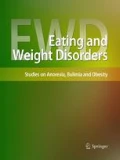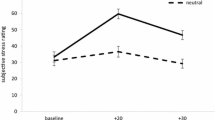Abstract
Basal release of GUT peptides has been found to be altered in restrained eaters. Stress-induced secretion, however, has not yet been described, but could be a biological basis of overeating that exposes restrained eaters to a higher risk of becoming obese. The aim of the present study was to compare restrained and unrestrained eaters with respect to stress-induced release of the GUT peptides ghrelin and PYY. 46 young women were studied. Blood sampling for peptides was done before and after the Trier Social Stress Test. Ghrelin secretion after stress was significantly elevated in the restrained eaters, whereas no significant differences were detected for PYY. Stress-induced release of GUT peptides can be interpreted as a cause as well as a consequence of restrained eating.
Similar content being viewed by others
References
Agras WS (ed) (2010) The Oxford handbook of eating disorders. Oxford University Press, New York
Chan JL, Stoyneva V, Kelesidis T, Raciti P, Mantzoros CS (2006) Peptide YY levels are decreased by fasting and elevated following caloric intake but are not regulated by leptin. Diabetologia 49:169–173. doi:10.1007/s00125-005-0041-2
Cummings DE, Weigle DS, Frayo RS, Breen PA, Ma MK, Dellinger EP, Purnell JQ (2002) Plasma ghrelin levels after diet-induced weight loss or gastric bypass surgery. N Engl J Med 346:1623–1630. doi:10.1056/NEJMoa012908
Forbes SC, Cox HM (2014) Peptide YY, neuropeptide Y and corticotrophin-releasing factor modulate gastrointestinal motility and food intake during acute stress. Neurogastroenterol Motil 26(11):1605–1614. doi:10.1111/nmo.12428
Gibson CD, Carnell S, Ochner CN, Geliebter A (2010) Neuroimaging, gut peptides and obesity: novel studies of the neurobiology of appetite. J Neuroendocrinol 22:833–845. doi:10.1111/j.1365-2826.2010.02025.x
Gluck ME, Yahav E, Hashim SA, Geliebter A (2014) Ghrelin levels after a cold pressure stress test in obese women with binge eating disorder. Psychosom Med 76:74–79. doi:10.1097/PSY.0000000000000018
Grilo CM, Masheb RM, White MA (2010) Significance of overvaluation of shape/weight in binge-eating disorder: comparative study with overweight and bulimia nervosa. Obesity (Silver Spring) 18(3):499–504. doi:10.1038/oby.2009.280
Hill BR, Rolls BJ, Roe LS, De Souza MJ, Williams NI (2013) Ghrelin and peptide YY increase with weight loss during a 12-month intervention to reduce dietary energy density in obese women. Peptides 49:138–144. doi:10.1016/j.peptides.2013.09.009
Keskitalo K, Tuorila H, Spector TD, Cherkas LF, Knaapila A, Kaprio J, Silventoinen K, Perola M (2008) The Three-Factor Eating Questionnaire, body mass index, and responses to sweet and salty fatty foods: a twin study of genetic and environmental associations. Am J Clin Nutr 88(2):263–271
Kirschbaum C, Pirke KM, Hellhammer DH (1993) The ‘Trier Social Stress Test’—a tool for investigating psychobiological stress responses in a laboratory setting. Neuropsychobiology 28:76–81. doi:10.1159/000119004
Kojima S, Nakahara T, Nagai N, Muranaga T, Tanaka M, Yasuhara D, Naruo T (2005) Altered ghrelin and peptide YY responses to meals in bulimia nervosa. Clin Endocrinol 62:74–78. doi:10.1111/j.1365-2265.2004.02176.x
Kristensson E, Sundqvist M, Astin M, Kjerling M, Mattsson H, Dornonville de la Cour C, Lindström E (2006) Acute psychological stress raises plasma ghrelin in the rat. Regul Pept 134:114–117. doi:10.1016/j.regpep.2006.02.003
Liang C, Luo H, Liu Y, Cao J, Xia H (2012) Plasma hormones facilitated the hypermotility of the colon in a chronic stress rat model. PloS One 7(2):e31774. doi:10.1371/journal.pone.0031774
Lowe MR, Thomas JG, Safer DL, Butryn ML (2007) The relationship of weight suppression and dietary restraint to binge eating in bulimia nervosa. Int J Eat Disord 40(7):640–644. doi:10.1002/eat.20405
Martins C, Robertson MD, Morgan LM (2010) Impact of restraint and disinhibition on PYY plasma levels and subjective feelings of appetite. Appetite 55:208–213. doi:10.1016/j.appet.2010.05.091
Monteleone P, Martiadis V, Rigamonti AE, Fabrazzo M, Giordani C, Muller EE, Maj M (2005) Investigation of peptide YY and ghrelin responses to a test meal in bulimia nervosa. Biol Psychiatry 57:926–931. doi:10.1016/j.biopsych.2005.01.004
Perry B, Wang Y (2012) Appetite regulation and weight control: the role of gut hormones. Nutr Diabetes 2(1):e26. doi:10.1038/nutd.2011.21
Polivy J, Coleman J, Herman CP (2005) The effect of deprivation on food cravings and eating behavior in restrained and unrestrained eaters. Int J Eat Disord 38(4):301–309. doi:10.1002/eat.20195
Pudel V, Westenhöfer J (1989) Fragebogen zum Eßverhalten (FEV)-Handanweisung. Hogrefe, Göttingen
Rouach V, Bloch M, Rosenberg N, Gilad S, Limor R, Stern N, Greenman Y (2007) The acute ghrelin response to a psychological stress challenge does not predict the post-stress urge to eat. Psychoneuroendocrinology 32:693–702. doi:10.1016/j.psyneuen.2007.04.010
Sarker MR, Franks S, Caffrey J (2013) Direction of post-prandial ghrelin response associated with cortisol response, perceived stress and anxiety, and self-reported coping and hunger in obese women. Behav Brain Res 257:197–200. doi:10.1016/j.bbr.2013.09.046
Schur EA, Cummings DE, Callahan HS, Foster-Schubert K (2008) Association of cognitive restraint with ghrelin, leptin, and insulin levels in subjects who are not weight-reduced. Physiol Behav 93:706–712. doi:10.1016/j.physbeh.2007.11.025
Soni AC, Conroy MB, Mackey RH, Kuller LH (2011) Ghrelin, leptin, adiponectin, and insulin levels and concurrent and future weight change in overweight postmenopausal women. Menopause (New York, NY) 18(3):296–301. doi:10.1097/gme.0b013e3181f2e611
Stice E, Marti CN, Rohde P (2013) Prevalence, incidence, impairment, and course of the proposed DSM-5 eating disorder diagnoses in an 8-year prospective community study of young women. J Abnorm Psychol 122(2):445–457. doi:10.1037/a0030679
Tanaka M, Naruo T, Muranaga T, Yasuhara D, Shiiya T, Nakazato M, Nozoe SI (2002) Increased fasting plasma ghrelin levels in patients with bulimia nervosa. Eur J Endocrinol 146:R1–R3. doi:10.1530/eje.0.146R001
Conflict of interest
On behalf of all authors, the corresponding author states that there is no conflict of interest.
Ethical approval
The study was approved by the ethical committee of medicine in Rheinland-Pfalz, Germany (ID: 837.159.096664).
Informed consent
Informed consent was obtained from all individual participants included in the study.
Author information
Authors and Affiliations
Corresponding author
Rights and permissions
About this article
Cite this article
Hilterscheid, E., Laessle, R. Stress-induced release of GUT peptides in young women classified as restrained or unrestrained eaters. Eat Weight Disord 20, 435–439 (2015). https://doi.org/10.1007/s40519-015-0185-0
Received:
Accepted:
Published:
Issue Date:
DOI: https://doi.org/10.1007/s40519-015-0185-0




